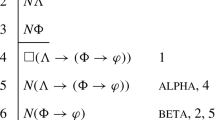Abstract
The purpose of this paper is to argue that the hybrid formalism fits naturally in the context of David Lewis’s counterfactual logic and that its introduction into this framework is desirable. This hybridization enables us to regard the inference “The pig is Mary; Mary is pregnant; therefore the pig is pregnant” as a process of updating local information (which depends on the given situation) by using global information (independent of the situation). Our hybridization also has the following technical advantages: (i) it preserves the completeness and decidability of Lewis’s logic; (ii) it allows us to characterize the Limit Assumption as a proof-rule with some side-conditions; and (iii) it enables us to establish a general Kripke completeness result by using the proof-rule corresponding to the Limit Assumption.
Similar content being viewed by others
References
Areces C., ten Cate B. (2007) Hybrid logics. In: Blackburn P., Benthem J., Wolter F.(eds) Handbook of modal logic.. Elsevier, Amsterdam, pp 821–868
Blackburn, P. (1990). Nominal tense logic and other sorted intensional frameworks. PhD thesis, Centre for Cognitive Science, University of Edinburgh.
Blackburn P. (1993) Nominal tense logic. Notre Dame Journal of Formal Logic 34: 56–83
Blackburn P. (1994) Tense, temporal reference and tense logic. Journal of Semantics 11: 83–101
Blackburn P. (2006) Arthur Prior and hybrid logic. Synthese 150(3): 329–372
Blackburn P., de Rijke M., Venema Y. (2001) Modal logic. Cambridge tracts in theoretical computer science. Cambridge University Press, Cambridge
Blackburn, P., & van Benthem, J. (2007). Modal logic: A semantic perspective. In P. Blackburn, J. van Benthem, & F. Wolter (Eds.), Handbook of modal logic (pp. 1–84). Amsterdam: Elsevier.
Blackburn P., ten Cate B. (2006) Pure extensions, proof rules, and hybrid axiomatics. Studia Logica 84: 277–322
Grahne G. (1998) Updates and counterfactuals. Journal of Logic and Computation 8(1): 87–117
Lewis D. (1973) Counterfactuals. Blackwell Publishing, Oxford
Nute, D., & Cross, C. B. (2001). Conditional logic. In Gabbay, D.M., & Guenthner, F. (Eds)., Handbook of philosophical logic (2nd ed., Vol. 4, pp. 1–98). Dordrecht: Kluwer Academic Publishers.
Stalnaker, R. (1968). A theory of conditionals. In N. Rescher (Ed.), Studies in logical theory, American Philosophical Quarterly Monograph Series (Vol. 2, pp. 98–112). Oxford: Blackwell.
ten Cate B., Litak T. (2007) Topological perspective on the hybrid proof rules. Electronic Notes in Theoretical Computer Science 174(6): 79–94
ten Cate B., Marx M., Viana P. (2005) Hybrid logics with Sahlqvist axioms. Logic Journal of the IGPL 13(3): 293–300
Author information
Authors and Affiliations
Corresponding author
Rights and permissions
About this article
Cite this article
Sano, K. Hybrid Counterfactual Logics. J of Log Lang and Inf 18, 515–539 (2009). https://doi.org/10.1007/s10849-009-9090-0
Received:
Published:
Issue Date:
DOI: https://doi.org/10.1007/s10849-009-9090-0




